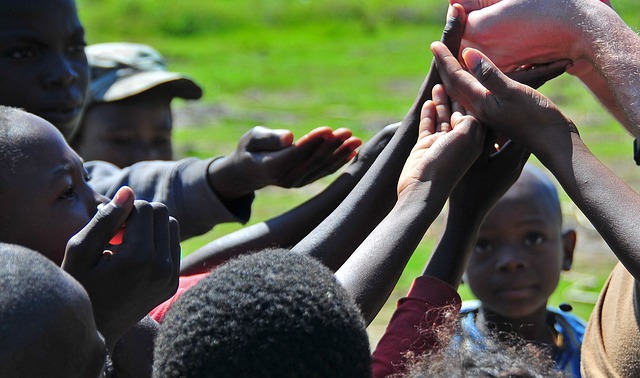Many holidaymakers visiting West Africa come into contact with children in Senegal begging for food and water on the street. But who are these children? Where do they come from, and who is forcing them to beg? And finally, should we give or not give – and what are the alternatives?
HOLIDAYING BETWEEN NATIONAL PARKS, COLONIAL HERITAGE AND BEGGING CHILDREN

International tourism has increased exponentially in West Africa in recent years, as growing numbers of people have been discovering the nature, culture and cuisine of this vast region stretching from the Sahara to the Atlantic. Frontrunner here is Senegal: located between Mali, Mauritania and Guinea, the country reports more visitors from western countries every year. As well as the breathtaking landscapes and colonial-era buildings of Dakar and Saint Louis, however, it’s not long before those tourists become aware of the Senegalese children who line the streets begging for money and food from tourists and locals alike. Many people give them a little something, often including some money.
Some of the children are still very young. They wear dirty clothing and carry paper cups, which are stretched out towards passers-by with a bashful facial expression. White tourists are particularly happy to give, and give generously; for many, being confronted by such extreme poverty is an overwhelming experience. The visual of the begging children is too pitiful, the conscience just too guilty not to give something. The signs posted in public spaces pleading with visitors not to give to the children, and to donate to local organisations instead, do little to change the situation.
WHO ARE THE BEGGING CHILDREN OF SAINT LOUIS, DAKAR AND TAMBACOUNDA?
Ask local people, and you’ll quickly learn that the children begging on the street are known as “Talibes”. They attend Senegalese Koranic schools, or “Daaras”, where they are often sent by parents or guardians to study the Koran. Some children are also sent away to Daaras by their families in an effort to escape poverty, as the schools are supposed to provide for their physical as well as spiritual welfare. In reality, however, while it may sound logical and enlightened to us, this has evolved into a questionable practice: because the Koranic schools are not subject to any state oversight or regulation, the conditions they offer can vary hugely. Many of the schools send the boys and young people entrusted to them out onto the streets, where they are supposed to beg for food and money from early in the morning until late at night. They are often given a predefined quota, which they are supposed to beg for every day. If a child doesn’t meet its quota, the consequences often include physical and other types of punishment. NGOs estimate the total number of child beggars to be over one hundred thousand, although no precise figures are available. According to their reports, forcing the under-age Talibes to beg represents the largest single sector of human trafficking in the West African nation.
STRUGGLING TO END CHILD POVERTY AND BEGGING: THE RESPONSIBILITY OF EVERY SINGLE ONE OF US
Officially, there are laws in place in Senegal banning such practices. Like many other laws that exist on paper, however, these are not consistently implemented by the authorities. The state would “look away with both eyes”, according to statements by local initiatives and NGOs. Organisations working on the ground have been trying for some time to draw attention to the issue at international and national level, and to raise awareness amongst locals and tourists alike. Western tourists particularly like giving to beggars, and giving a lot. This is often because they know nothing about the children’s backgrounds or problems, and are simply trying to help. In fact, however, the problem of children being forced into begging can only be solved if as broad a strategy of education as possible can be put into operation. Enforced begging restricts the Talibes in their right to attend school or get an education. Their begging exposes the children to a range of dangers from which society should be protecting them. Enforced begging is a form of modern slavery, says children’s rights NGO Humanium, and neither religion, tradition nor other issues should serve as an excuse for this fundamental breach of human rights. Travellers should inform themselves about the children’s backgrounds and problems when they visit Senegal. And even if it is hard not to give children begging some money or food, all one is actually doing is supporting a system and practice which, with the help of many, will hopefully soon belong to the past.
GIVE TO LOCAL NGOS RATHER THAN BEGGARS
So how can you help the children begging in Senegal now? Experts and local organisations unanimously believe that not giving is actually the more ethical decision, even if it can feel very hard not to do so. Instead, you should donate to local projects and organisations (Humanium, Mehr als 100,000 Kinder) that have an insight into the communities and problems on the ground and help the children in different ways. Not least, this includes speaking to other travellers and doing urgently necessary educational work, so that children begging in Senegal will soon be a thing of the past.
Translation by Tim Martinz-Lywood, European Exchange Ltd.
www.european-exchange.co.uk
#Ausbeutung #Kinderbettler #Senegal #AgainstHumanTrafficking #GegenMenschenhandel #EndExploitation #EndTrafficking #HopeForTheFuture #Österreich
